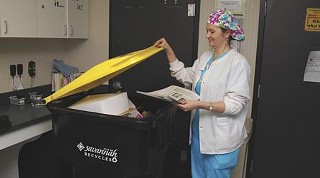Katie Joyner knew recycling at St. Joseph’s/Candler would work, the problem was convincing everybody else.
"I would always bring it up in conversation," says Joyner, a senior graphic designer in the health system’s marketing department. "The answer was always it was too complicated, or it wasn’t sanitary. There always was an answer that was a ‘no.’"
But that didn’t stop Joyner from recycling in her department. "I recycled at home before the whole city thing started," she says.
Every couple of months or so, the office bin would get full. "I’d separate it out and take it all to my bin at home," Joyner says. "Then I’d take it to the military base to be recycled."
Joyner grew up recycling. "My mother recycled in our home," she says. "It’s something I always did."
Before moving to Savannah, Joyner lived in North Carolina. "I originally moved to Wilmington, where it was easier to recycle because we had bins at home," she says.
"I moved to Savannah in 2001 and I didn’t recycle the first year because I had no idea how to," Joyner says. "I figured out you could go to the base and that there were bins downtown."
Recycling helps the environment, Joyner says. "I think it’s important to ensure that the landfills don’t take over the country,"
Joyner was delighted when the city began its recycling program. Just a week ago, she learned that St. Joseph’s/Candler is the first company in Savannah to join the city as a partner in its recycling effort.
"I think it’s great, especially since St. Joseph’s/Candler is one of the larger companies in Savannah," Joyner says. "It’s less work for me. Hopefully, it will make others want to do it as well."
About 180 recycling bins have been placed at the systems two hospitals. "Everybody wants to recycle," says Director of System Process Improvement Celeste Shearouse.
Planning for the recycling program began with St. Joseph’s/Candler’s Community Benefits Committee. "We’ve gotten a lot of feedback from staff," Shearouse says.
"When you’re first talking about something like that, it seems huge," she says. "You realize you need to collect cans, plastic bottles. We decided to look at programs at other hospitals, and talk with some companies that will come in and set up a recycling program."
While the committee was going through the planning process, the city decided to start its own single-stream recycling program. St. Joseph’s/Candler was invited to participate, and Stephanie Cutter, the city’s sanitation bureau chief, was asked to meet with the committee.
"The enthusiasm was great," Shearouse says. "We had some naysayers, not in the fact that they didn’t want to recycle, but that they thought it would be so much work."
But when the program was explained to all departments, everyone came on board. "We set up a little grid to show who was going to do what, and everything went unbelievably smooth," Shearouse says.
The city provided two large bins, plus black-and-yellow lidded bins. "We put those in the units, in administration, in the cafeteria, so people could use them," Shearouse says. "On the bin, it tells you what can go in there."
Some educational classes were held at Candler, and will be held at St. Joseph’s this week. Bins also will go to the health system’s off-site properties, such as Medical Arts and off-site health clinics.
The bins will be emptied once a week, and each bin will be monitored to make sure it really is needed. The project has already had some surprising outcomes. "What we didn’t expect is that this is actually saving us a lot of money," Shearouse says.
During the planning stage, the committee had contacted waste management companies and were told handling the recycled items would cost between $250,000 to $500,000 per year. "The city said they will do it free," Shearouse says. "I can’t believe the support we’ve gotten from the city. There really haven’t been any wrinkles."
The amount of trash hauled away already has been reduced. "Most goes in the recycling bins," Shearouse says. "Prior to putting those bins in, it all would have gone to the landfill."
St. Joseph’s/Candler produces about 1,700 tons of municipal waste annually, and the committee at first thought recycling would reduce that by 25 percent. "We already are realizing we are going to exceed that 25 percent," Shearouse says.
Many of the anticipated problems haven’t materialized. "Simply because this is a hospital, we don’t want the bins near the patients’ rooms," Shearouse says. "We were concerned about putting Coke cans in and having fruit flies, but we were told to just take the can and rinse it out really quickly and put it in the bin.
"People have been very good about that," she says. "We haven’t had any issues about that type of thing.
"It would be fantastic if other businesses as large as St. Joseph’s/Candler took advantage of the city’s great program and partnered with them as we have," Shearouse says. "It’s the right thing to do."
























